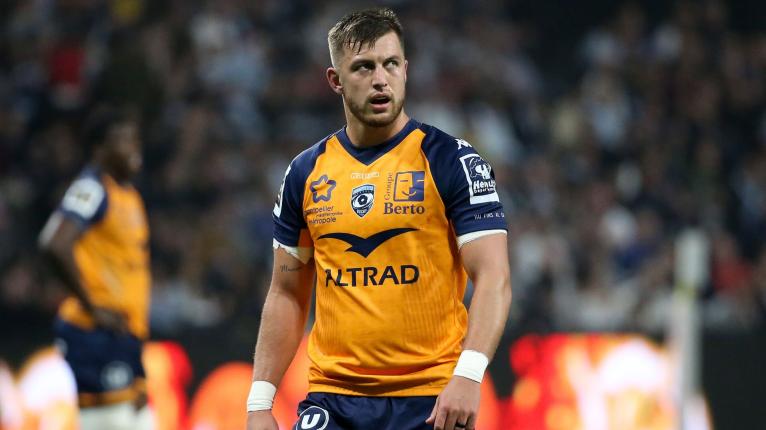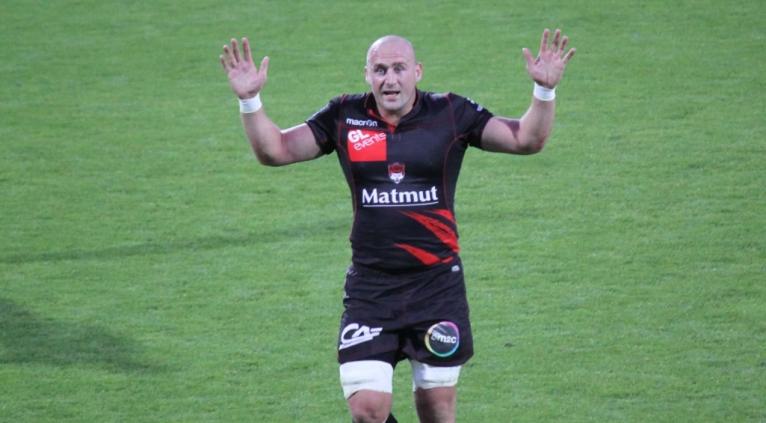After the pandemic: blood on the streets as a new-look future for French pro rugby emerges

While politicians and ordinary people grapple with the cold hard facts of the global health crisis, French professional rugby, like elsewhere, is now looking to a new reality beyond the acute financial pain of the coronavirus shutdown.
The immediate situation looks like this: All amateur competitions have ended for the season. France’s professional leagues have been suspended since March 13. A meeting of the LNR, scheduled for Tuesday, April 7, to decide the future of the current Top 14 and ProD2 seasons has been delayed until the end of the month.
“Faced with a complex and evolving situation, the Ligue Nationale de Rugby is giving itself time to reflect before taking, in consultation with the FFR, the first decisions related to the situation,” the LNR said in a statement.
While that decision has yet to be made. Bernard Laporte on Wednesday warned that, chances are, this season cannot be rescued.
Stopped after 17 rounds of the 29-weekend competition, French media report there are two favoured scenarios as the Top 14 tries to recoup some of the €100million it is expected to lose if the 2019/20 campaign is cancelled outright. It could maintain the current June 26 date for the final, with a shortened run-in; or move the final to July 18 – with the contractual issues that necessarily follow.
Those plans could be moot. As Robins Tchale-Watchou, president of players’ union Provale, said: “We have an unknown that complicates the various equations, which is how the health situation will evolve. Depending on when it ends, we may not be able to continue.
“Despite the goodwill of all the different actors, this unknown imposes itself on us.”
Tchale-Watchou’s ‘unknown’ will define everything the LNR decides for this season, and mch of what will happen for several years to come. Anyone expecting a rapid return to normality following the Covid-19 pandemic is fooling themselves. After this – whenever this ends – we will all have to adapt to a new normal. In rugby, as in real life.
For the former, cause and effect have already gone hand in hand. The virus has been the catalyst of a slamming halt in player recruitment in France’s top flight – as well as some serious rethinking of the future.
Things were already changing. The ever-evolving, ever-tightening JIFF regulations were already, slowly changing the face of French rugby. But Covid-19 has done in a matter of weeks what it took the JIFF regulations 10 years to achieve.
From next season, established Top 14 teams can have 14 non-JIFF players on their books, including any emergency short-term ‘medical jokers’. They must also average 16 JIFF-qualified players in their matchday squads across the season.
For financial reasons, clubs were looking to and investing in their academies. Toulon have made a big show about their new-build set-up at Berg, and their newly discovered quest for local talent. Ugo Mola’s Toulouse rebuilt from the youth up after Didier Lacroix took over the presidency and plugged a gaping hole in the club’s finances.

Look, too, at the crop of recent under-20 players with extensive top-level experience thanks, in part, to a coherent pathway put in place by France U20 coach Sebastien Piqueronies.
New compensation rules also mean clubs are repaid for the commitment and money they have spent developing young players who then sign their first professional contract for another side.
But it is Covid-19, its subsequent lockdown and the instantaneous drying-up of club income, rather than the slower processes already in place, that have combined to bring the entire overseas hiring process to a halt.
“Everybody has put an absolute brake on recruitment, on spending,” Brive President Simon Gillham told The Rugby Paper this week. “Everyone’s cutting back. Clubs are looking at young players in the academies, and saying, ‘how can we make do with those?’.
“Now is not the moment for shipping in expensive marquee players,” Gillham added. “There’s going to be a lot more focus on ‘local’ – locally produced, homegrown. We’re all going to have to sit down and say, ‘okay how do we reconfigure this?’.”
He is not the first club president to sound the alarm on French rugby’s finances. Even those with the deepest pockets have voiced their concern. “I can’t think of any other economy more fragile and uncertain than ours,” Montpellier’s Mohed Altrad told L’Equipe. “The balance between income and expenditure is in deficit, and we cannot live forever at a loss.”

Meanwhile, in an interview with Le Figaro, Thomas Lombard, managing director of Stade Francais, said: “The economic model of rugby is on the verge of faltering because of this crisis. We have probably gone too far – and I include my club in this. The urgent question today is how the clubs will survive.”
His living-beyond-our-means comments echoed those of a former Stade president, Thomas Savare, who sold the Paris outfit to Capri-Sun King Hans-Peter Wild after the failed merger with Racing 92.
Clermont’s Eric de Cromieres, meanwhile, revealed the club loses about €800,000 for every home game it doesn’t play. With five home games between the start of the league’s suspension and the end of the 26-week regular season, the club could be out of pocket to the tune of €4million just from that stream alone.
Gillham is at least optimistic. “It’s not as bad as some people make out. The club owners and presidents – we’ve been talking to each other an awful lot over the last few days – are incredibly responsible people with an absolute passion for the game.
Most of Sale's Boks are in SA.
– @chrisjonespress with the latesthttps://t.co/CQ0un6kInZ
— RugbyPass (@RugbyPass) April 8, 2020
“There are virtually 30 clubs like that. They’re acting responsibly. But there will be a change. There’ll be a lot of players on the market. They’ll be looking again at people’s salaries. People will look at things differently.”
Some of his predicted effects can be seen already. Incoming recruitment has stopped as clubs tighten their belts.
Kurtley Beale, who is heading to Racing 92 on a reported €400,000-a-year deal, is a rare big-name signing from outside France next season. That sum is much lower than the €1.2million the club paid Dan Carter a year, or the €600,000 Bordeaux have forked out for Semi Radradra’s defence-cutting services for two seasons.
Meanwhile Lyon’s outgoing number 8 Carl Fearns has already spoken about the fast-evaporating interest from clubs in the wake of the virus outbreak.
“It’s frustrating because the market is collapsing and I find myself in a difficult position,” he recently told The Rugby Paper. “Clubs are no longer talking about contracts and new signings.”

Fearns, who admitted he is considering the prospect of premature retirement if he comes to the end of his contract with Lyon in June with no place to go, is not alone. All Black Colin Slade, who joined Pau after the 2015 World Cup in England, has not been offered a new contract. There is no news on where the 32-year-old may end up.
Other big names out of contract at the end of the season include Dominic Bird, Donnacha Ryan, Ben Volavola, Sergio Parisse, Mamuka Gorgodze, Liam Messam, Nick Abendanon, and Greig Laidlaw.
It’s not just overseas stars seeking a new home. As it stands, experienced French players Benjamin Fall, Marc Andreu, Alexis Palison, Hugo Bonneval, Remy Grosso and Maxime Mermoz will find themselves out of work when their current contracts expire on June 30. Andreu and Grosso have both admitted retirement is not far from their thoughts.
With rugby rapidly rethinking its finances, player salaries are a prime target.
It means big-money players, used to marquee prices, are set to find their transfer market bargaining power greatly reduced, and those with JIFF status will be at an advantage. With clubs putting a freeze on recruitment during the Covid-19 crisis, supply looks set to exceed demand once the market finally reopens.
Between 2008 and 2018, according to the most recent report by the sport’s financial watchdog, the DNACG, the “average gross player payroll per club” jumped from €5.4million to €9.6million. Last season, they accounted for more than half of clubs’ operating expenses.
Revenues – including TV rights – have also increased, but more slowly.
Some clubs – Montpellier, Stade Francais, Racing 92, and Lyon – have a mega-rich patron to make up any shortfall. Others are company backed, such as Castres, and – to a certain extent – Clermont. Some rely more heavily than most on filling their stadiums – Toulouse, Bordeaux and La Rochelle fall into this category.
But, sooner rather than later, and as Toulon are already doing, clubs will have to change their model to fit their new circumstances. There will be fewer big-name stars chewing up the salary cap and a greater emphasis on younger, cheaper, French players.
As Tchale-Watchou said: “There was a before, and there will be an after.” After Covid-19, French rugby will have to review its lifestyle and cut down on the big salary, big name carbs.
The focus then shifts to other issues. The current TV deal – worth €97million a year – lasts until 2023. Relations between the league and pay-TV broadcaster Canal Plus are strong, but will the post-2019/20 French rugby product generate another big-money agreement? Will the fans approve of the changes? How will the new-look domestic landscape affect the national team, which was threatening to wake up again after a decade of slumber?
More questions, then. Few answers. Uncertainty is the only certainty in a post-Covid rugby nation.








































































